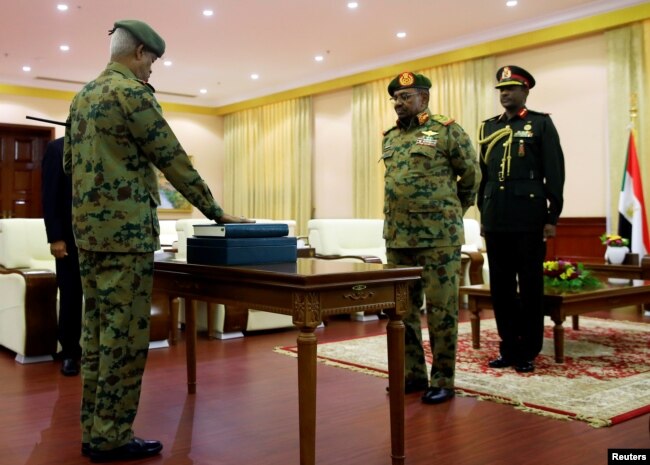In Post-Bashir Sudan, Calls Grow Louder for Civilian Rule
Railway workers and other protesters gathered in Atbara, the northern
transport hub where the uprising began in December, and traveled by
train to the capital to join tens of thousands outside the military
headquarters in Khartoum, where protesters have kept up a sit-in since
April 6.
Al-Bashir, who ruled Sudan for 30 years, was forced from office on April
11 after four months of protests led by the Sudanese Professionals
Association, a group of private unions that is demanding a full and
immediate transfer of power to a civilian council.
The SPA suspended talks with the military over the weekend after the
military council said it was consulting all of Sudan's political forces
on a path forward. The protesters accuse the council of failing to make a
clean break with al-Bashir's regime and of trying to marginalize the
SPA by depicting it as one of many political factions.
The SPA says the head of the military council's political committee and
its chief negotiator, Lt. Gen. Omar Zain al-Abdin, was the head of
al-Bashir's party within the military and "is trying to bring back the
deposed regime."
The protesters also say the military council has yet to recognize the
Forces of the Declaration of Freedom and Change — a coalition led by the
SPA and including other groups — as their representative. The
protesters fear Islamists and other factions close to al-Bashir, who is
now jailed in Khartoum, will have a role in the transition.

FILE - DefenSe Minister Awad Mohamed Ahmed Ibn Auf (L), an ex-military intelligence chief is sworn in as first vice president in front of former President Omar al-Bashir during a swearing in ceremony of new officials after Bashir dissolved the central and state governments in Khartoum, Sudan, Feb. 24, 2019
The military council has said it is in talks with all political
parties to name a prime minister and civilian government to run the
country for two years.
The SPA has instead called for a Cabinet of technocrats to run the
country's daily affairs. They have also called for a legislative
council, in which at least 40 percent of the membership would be women,
to draft laws and oversee the Cabinet until a new constitution is
written.
The SPA plans to announce its own civilian transitional council during mass rallies on Thursday.
In Cairo, meanwhile, President Abdel-Fattah el-Sissi hosted a meeting
with Moussa Faki, the chairman of the African Union commission, and
several other African leaders to discuss the situation in Sudan.
Bassam Radi, spokesman for Egypt's presidency, said the leaders agreed
to give Sudan's military three months to hand over power to a
"civilian-led political authority" or face suspension from AU
activities. The AU had initially given the military 15 days to transfer
power to civilians.
VOA
AFEEF:
Hadhwanaagnews marnaba masuul kama aha Aragtida dadka kale. Qoraaga ayaa xumaanteeda, xushmadeeda iyo xilkeeda sida. waxa kaliya oo Hadhwanaagmedia dhiirigalinaysaa, isdhaafsiga aragtida, canaanta gacaliyo talo wadaagga!




 0
0 






